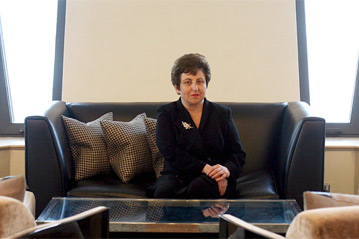Q&A: Shirin Ebadi, documenter of refugee issues in Iran
Q&A: Shirin Ebadi, documenter of refugee issues in Iran

TEHRAN, Islamic Republic of Iran, August 8 (UNHCR) - In 2003, Iranian lawyer and human rights activist Shirin Ebadi was awarded the Nobel Peace Prize for her work on behalf of democracy and human rights, in particular the rights of women and children. In a tradition going back decades, Iran has provided safety and shelter to hundreds of thousands of refugees fleeing violence and persecution in countries such as Afghanistan and Iraq. Ebadi recently released "Refugee Rights in Iran," an updated and English-language version of a work first produced in 1994 and used for years as a protection handbook by the UN refugee agency. She spoke recently to Senior External Relations Assistant Amir Barmaki and Senior Public Information Clerk Dina Faramarzi, both based in Tehran. Excerpts from the interview:
Tell us about the book and how you came to write it?
My main field of activity is human rights, which includes refugee law. I had written several books on various aspects of human rights, including children's rights, But later, because of the presence of refugees in Iran and because the country had signed the [1951] international Convention [on refugees], I decided to study the situation of refugees in Iran from the legal point of view. That's how I came to write the book. I have also started writing a book on the life of refugees in Iran.
How is the refugee situation in Iran in your opinion?
The Islamic Republic of Iran was established (1979) based on the ideology that Islam has no borders and that Islamic lands belonged to all Muslims. The Islamic Republic welcomed Afghans fighting the occupying forces - first Russia, then the Taliban. As a consequence, around 4 million Afghans entered Iran with the implicit permission and knowledge of the government.
But this caused a problem because residence permits were issued for a very restricted number of these Afghans. The rest, even though they had entered the country based on the implicit permission of the government, later faced many problems because they had no documents proving legal entry to Iran. Afghans could not even open savings accounts in Iranian banks. They had to carry cash and this caused a growth in crime amongst Afghans.
The other problem faced by those lacking legal documents was that the government refused to issue IDs for their children born in Iran. Many Afghan children were unable to go to school because they lacked ID cards.
Iraqi refugees faced slightly different problems. During the two Gulf Wars [1991 and 2003], the Iranian government-based on the experience it had gained from the influx of Afghan refugees - did not allow unconditional entrance, but instead constructed shelters on the border.
For refugees around the world there are three main solutions: repatriation, local integration or resettlement. Which is most relevant in Iran?
The first thing that needs to be done is to control movement across Iran's eastern border. When I visited the border about four years ago, there were only four border guards to control a long section. If an Afghan refugee decides to return home, it shouldn't be so easy for that person to return to Iran is he chooses to. The only way to prevent this is by proper control of the border.
The second step that needs to be taken is to give legal status to refugees who have built families in Iran or who have had children here. People who entered the country as foreign labourers in recent years should be given temporary work and residence permits. The international community, meanwhile, should provide Iran with financial and technical assistance and accept refugees who are not willing to return to their country.
Do you think it is safe enough in Afghanistan for refugees to return?
According to some reports, around 60 percent of Afghanistan is still under the rule of the Taliban and the necessary security for a peaceful life still does not exist in that country. Recently, there was an explosion at the Indian embassy in Kabul, which left many people dead. When the situation is like that, we cannot force Afghans to return. Just having a government does not mean that there is security in a country. I believe that Afghanistan has not yet managed to provide its citizens with enough security and so forcing Afghan refugees out of Iran is unfriendly and a breach of international law.
What can be done to ensure that all refugees are not sent back?
A number of Iranian non-governmental organizations are working to protect the rights of Afghan and Iraqi refugees in Iran and we can not blame the unemployment amongst Iranians on the Afghans. That is we can not say that Afghans are occupying the jobs of the Iranians. If you take a look at the list of jobs Afghans are doing in this country, you would see that most of them are employed as simple municipality labourers, or simple labourers working on construction sights or in the agriculture field, jobs that many Iranian labourers are not willing to do. So, I don't believe that Afghans are hurting Iran's job market.








